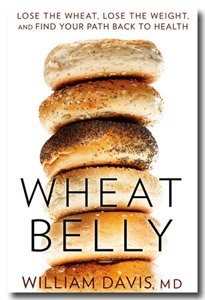A few weeks ago my friend Michelle McNally tweeted a link to this interview with Dr. William Davis, author of Wheat Belly. I was impressed with Dr. Davis, so I put it on my hold list at the library and started discussing it with people I respect. Michelle had already made several dietary changes for her family after her daughter was diagnosed with multiple (17) food sensitivities, but she changed her own diet even when her daughter was not around after reading this interview. Beyond wheat free, Michelle’s daughter is also sensitive to yeast, which eliminates some wheat-free choices in addition. 
Hazel Walker is an author, speaker, and personal mentor. She states, “at age 55 I am looking closely at the cause and effect that some foods are having on MY Body. I had already given thought to wheat being an issue, this just confirmed what I thought.” Hazel has committed to 31 days wheat free. She taught me that gluten free, does not always mean wheat-free.
What really caught my attention was the quote from Dr. Davis, “what you are being sold called “wheat” is really not wheat at all, at least nothing like the wheat of 1950 that our mothers and grandmothers had. Modern wheat is the product of extensive genetics experiments conducted during the 1960s and 1970s to increase yield.” Eliminating partially hydrogenated soybean oil and high fructose corn syrup were my first steps to purifying my diet, and I have made every effort to avoid genetically modified foods. The thought that there may not be non-genetically modified wheat available in the United States any longer is frightening to me. I normally promote a balanced diet, avoiding processed foods but not any foods in particular. Cutting out wheat sounds very drastic, but as Dr. Davis says, “I don’t think that modern wheat should even be considered food…Modern wheat is not a creation of nature. It is the creation of geneticists.”
In my house, we only use wheat flour, but we use it often baking bread, creating pasta, and preparing pancakes. I was told that organic flour might not be genetically modified, but I have heard conflicting opinions on this. I often buy vanilla while traveling, so I will also be looking into if is possible to buy non-genetically modified flour in other areas of the world. For substitutes, Michelle suggests “two good wheat free baking mixes- Better Batter and Arrowhead Mills. Between the two of them, we can enjoy pancakes and a pita bread we use all the time. Using salad as a bed for a sandwich works, as well as using potatoes instead of pasta in soups.” I did not have any luck at a large, local grocery chain; however, Michelle said she has had good luck at “Trader Joe’s, Whole Foods, Kroger, and Meijer, as well as Nature’s Pharm here in Indianapolis.” She also said, “Amazon’s subscribe and ship is also a lifesaver.”
After each trying a wheat-free diet for several weeks, Hazel reports, “I have lost 3 pounds, my belly is not bloated!! And I have been paying attention to my body pain; I was having a lot of aches in my joints, that was one of the things that I was looking at fixing.” Additionally, Michelle reports, “I’ve been sleeping better, and, this may be TMI, but I’ve been less gassy. It’s interesting.” Personally, I have not gone completely wheat-free yet, but I am consciously scaling back. Knowing that I have wise friends for support and to answer questions will make any lifestyle change easier.
I’d love to hear your thoughts and advice on a wheat-free diet!
Also Read:
Recipe: Gluten-Free Stuffing
